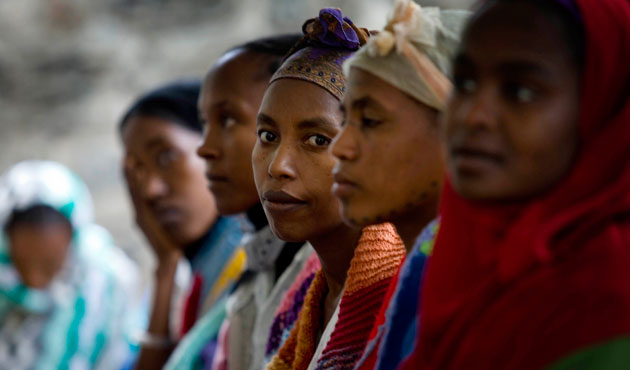Men in sharp, dark suits are sashaying through the restaurants and meeting rooms of a five-star Swiss ski resort this week as the annual meeting of the World Economic Forum in Davos gets under way.

The zip in the step of the business and political elite there is enabled by the world’s current inequality crisis, concentrating power among a select few at places like Davos and leaving the rest of us virtually powerless. For many, the images of Friday’s presidential inauguration of Donald J Trump will be viewed as the nadir of the same crisis in what is set to be a gloomy 2017.
Except that women worldwide, who have long found themselves on the wrong side of the inequality crisis, are refusing to let the lights go out. In fact they’re kindling the flames of change every day.
Women in Gombe State, Nigeria are prohibited from owning land and can only farm on the small plots allocated to them by the men at the head of the family. When it comes to selling the produce they themselves grow on the land, their husbands often snatch the hard-earned money to spend on alcohol. So women there are fighting back.
From government workers to manual labourers, women are standing up to this age-old injustice and are furtively squirreling away small amounts of money to save for when the sun isn’t shining. To make sure they’re not discovered, the women turn to their mothers who help hide the cash on their behalf.
In Haiti’s Central Plateau region, one woman got so fed up of her male counterparts ignoring the back-breaking work of cooking, cleaning, caring, planting, tilling, that she started her own organisation. Having started with a group of ten friends, Jacqueline Féquière Morette now leads 50 women on their own journeys to reclaim power through the growing and selling of their own food.
The women learn new farming techniques, save money as a cooperative and when they hit an obstacle, they speak as one to make the men in local government sit up and listen. Jacqueline’s organisation, the Association des Femmes Unies de Pouly, now cannot be ignored and local men are even encouraging women to take part as the benefits of sharing power become clear.
And in Nepal, Nirmala Mahatara has propelled herself from living in profound poverty to campaigning for the rights of rural women across the country with the national movement, Mahila Adhikar Manch.
Enraged at the laws which punish and abuse women – those accused of witchcraft, sold into marriage, survivors of rape – her organisation helped to bring the issue right up into the face of male-dominated power by encouraging 3,000 women to sleep out in the street in front of parliament in protest. Nirmala and her organisation now have a voice in conversations around Nepal’s new constitution.
The resistance of women in Nepal, Haiti, Nigeria and beyond is our hope as they dismantle the barriers to equality right in front of them. As Nirmala, Jacqueline and others raise their torches higher, more light will slowly shine on the hurdles women, and men, need to overcome for an equal world.
But the challenge is extreme. Only one in ten of the world’s heads of government are women, and as ActionAid highlighted in 2016, women around the world end up working four more years on average than men. We found women are collectively losing out on an unfathomable $9 trillion a year because of unequal pay and poor access to jobs. A sum of money that would seems as absurd to most ordinary people as an invite to join presidents and billionaires in Davos would.
On top of this, when women protest unequal power, they are met with resistance so violent and dangerous that they cannot even risk attaching their own names to stories of how they save their money in Gombe State, Nigeria. For the flames lit by Jacqueline, Nirmala and the women in Nigeria to catch, fuel needs to pour in from all sides. Less than one month into a year that will feel some of the biggest global political uncertainty in history, we have a staggering opportunity to fight gender inequality and rebuild our society as it shifts before us.

